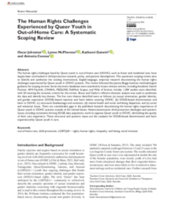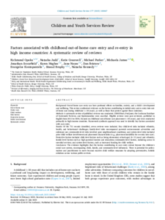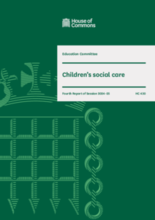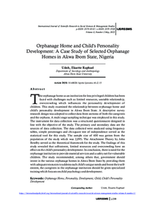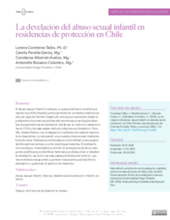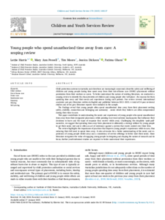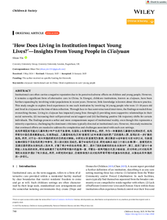Displaying 11 - 20 of 1510
The human rights challenges faced by Queer youth in out-of-home care (OOHC), such as foster and residential care, have largely been overlooked in child protection research, policy, and practice development. This systematic scoping review aims to identify and synthesize the existing international, English-language, empirical research documenting the human rights challenges experienced by Queer youth in OOHC systems.
Out-of-home care entry can have profound effects on families, society, and a child’s development and wellbeing. This review synthesised evidence on the factors contributing to initial entry and re-entry into out-of-home care during childhood (<18 years), as well as those that protect against these outcomes.
This report makes a series of recommendations on issues affecting all types of care, including foster care, adoption, kinship care, children’s homes, and support for disabled children in the UK.
This project explored the experiences of young people in Australia living in ‘therapeutic residential care’ to understand what helps or hinders them in building trust and feeling safe. Drawing on interviews and surveys, it shares insights directly from the young people about what works well and what could be improved.
This study investigated how conditions in orphanages—such as limited resources, unstable relationships, and overcrowding—affect children’s personality development in Akwa Ibom State, Nigeria, using surveys of both caregivers and orphans. Findings showed that these factors negatively impact self-esteem and overall development, highlighting the need for greater government investment, adequate resources, and specialized caregiver training in child psychology and development.
El abuso sexual infantil constituye un grave problema mundial que resulta muy difícil develar, particularmente en contextos institucionales y sin soporte familiar. Desde allí, se busca comprender, desde la perspectiva de personas adultas sobrevivientes y psicólogas tratantes, las experiencias de develación del abuso en entornos residenciales en Chile y las respuestas institucionales tras su develación.
This research examined children’s homes, one of the residential child care institutions in Turkey, in terms of spatial aspects, institutional functioning and, child-care staff relations.
In this commentary, two examples of how research often cited in calls to eliminate residential care has been inappropriately overgeneralized.
A scoping review of 31 studies (2013–2023) examined why children and young people in out-of-home care in Australia spend unauthorised time away from placements. Findings show these absences often reflect efforts to seek safety, stability, connection, autonomy, and belonging, highlighting systemic shortcomings and the need for youth-informed practices that address needs both in care and while away.
This study explored the experiences of 14 adolescents living in a ci'aiyuan childcare institution in Xiangxi, China, finding that it sometimes fostered supportive relationships, enhanced perceived social support, and facilitated positive life changes. While these accounts challenge dominant negative views of institutional care, the study emphasizes the need to address ongoing complexities and challenges in such settings.

